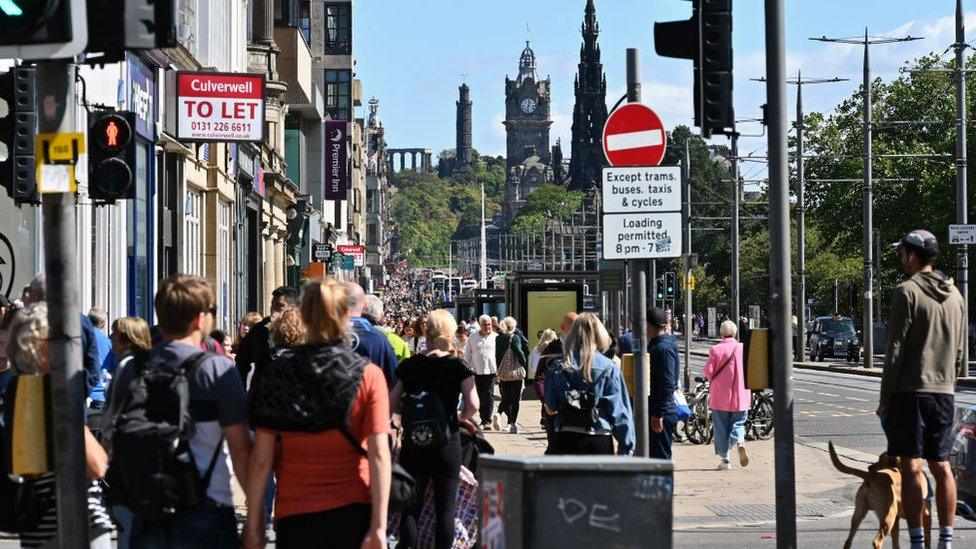Scottish economy forecast to grow slower than UK
- Published
- comments

Scotland's population is projected to drop by 900,000 people over the next 50 years
Scotland's economy is projected to grow more slowly than the UK over the next 50 years, according to the Scottish Fiscal Commission (SFC), external.
The independent body projected that Scotland's GDP would grow by 0.9% per year on average between 2028-29 and 2071-72.
This is compared with growth of 1.4% for the UK as a whole.
Scotland's population is also forecast to drop by as many as 900,000 people over the next 50 years.
The proportion of the population aged between 16 and 64 is projected to fall by eight percentage points by 2072, to 56% of the total population, compared with a six percentage point drop in the UK.
The report also predicted that Scotland's population would be on average 7.6 years older in 2072 than it is currently, compared with 6.1 years older in the UK as a whole.
The number of people over the age of 64 in Scotland is expected to rise by 12% by 2072.
GDP per person is also projected to grow at a slightly slower rate than in the UK, the commission predicted, with an annual average increase in Scotland of 1.3% compared with 1.4% in the UK as a whole.
Low fertility rate
The report said the more acute ageing population in Scotland was primarily a result of a low number of births caused by a low fertility rate combined with an already older population.
A decrease in net migration is also predicted to contribute to the change but to a lesser extent.
The SFC was set up by the Scottish government in 2014 and publishes economic and fiscal projections for Scotland's economy to inform government spending and taxation plans.
The interim projections it published on Tuesday come ahead of a full report next year on the economic challenges of Scotland's population trends over the next five decades.
Prof Graeme Roy, the chairman of the SFC, said: "While Scotland is no different from most high-income economies in facing demographic pressures, those facing Scotland are particularly acute.
"Our fiscal sustainability report next year will explore how these will affect the Scottish budget in the future.
"Politicians and those delivering public services will need to consider how to respond to these future fiscal pressures."


Economic projections depend on taking recent trends and pushing them into the future. And if the past few years are any guide, there's a lot that will squeeze Scotland's economy in the next 50 years.
But of course, things change; technology replaces some jobs with automation, and creates others we haven't yet imagined.
The idea that people stop work at 65 is already outdated; Policy on migration can stem the loss of population or exacerbate it; Scots may have bigger families, or smaller, for various reasons, many of them financial; and people may live longer, or maybe shorter lives than assumed in economic models.
So the demographic forecasts tell us the course we're on, if other things don't change, and if we don't make choices to change them.
It tells us to expect slow growth, population decline, fewer children and fewer people of working age who pay most of the tax, with a big rise in older people, who tend to cost more in public service provision.
Today's report from the Scottish Fiscal Commission is the prelude to a study, due next March, of what this could mean for the taxation base (shrinking) and public spending (rising).
The Commission has already warned about more shorter term pressures arising from Scottish government promises on welfare benefits that will be hard to sustain, while Audit Scotland points to health and social care pressures that are already unsustainable.
You can safely predict that the report next March will not be comfortable reading for policy-makers, and particularly those who wish to retain the current range of public services that are free to use.